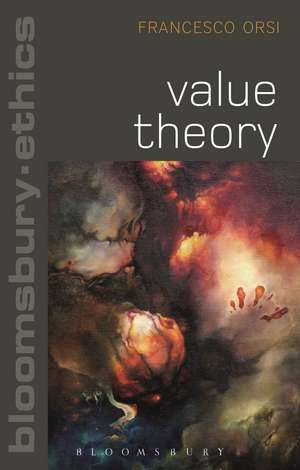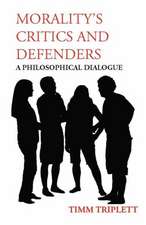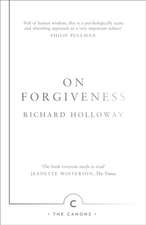Value Theory: Bloomsbury Ethics
Autor Francesco Orsi Prof Thom Brooksen Limba Engleză Paperback – 28 ian 2015
| Toate formatele și edițiile | Preț | Express |
|---|---|---|
| Paperback (1) | 183.24 lei 6-8 săpt. | |
| Bloomsbury Publishing – 28 ian 2015 | 183.24 lei 6-8 săpt. | |
| Hardback (1) | 566.78 lei 6-8 săpt. | |
| Bloomsbury Publishing – 28 ian 2015 | 566.78 lei 6-8 săpt. |
Preț: 183.24 lei
Preț vechi: 213.96 lei
-14% Nou
Puncte Express: 275
Preț estimativ în valută:
35.06€ • 36.68$ • 29.13£
35.06€ • 36.68$ • 29.13£
Carte tipărită la comandă
Livrare economică 03-17 aprilie
Preluare comenzi: 021 569.72.76
Specificații
ISBN-13: 9781472532923
ISBN-10: 1472532929
Pagini: 184
Dimensiuni: 138 x 216 x 13 mm
Greutate: 0.25 kg
Editura: Bloomsbury Publishing
Colecția Bloomsbury Academic
Seria Bloomsbury Ethics
Locul publicării:London, United Kingdom
ISBN-10: 1472532929
Pagini: 184
Dimensiuni: 138 x 216 x 13 mm
Greutate: 0.25 kg
Editura: Bloomsbury Publishing
Colecția Bloomsbury Academic
Seria Bloomsbury Ethics
Locul publicării:London, United Kingdom
Caracteristici
Provides a comprehensive guide through an overview of both classic and contemporary theories
Notă biografică
Francesco Orsi is Senior Research Fellow in Practical Philosophy at the University of Tartu, Estonia.
Cuprins
1. Value and Normativity1.1 Introduction1.2 Which Evaluations?1.3 The Idea of Value Theory1.4 Value and Normativity1.5 Overview1.6 Meta-ethical Neutrality1.7 Value Theory: The Questions2. Meet the Values: Intrinsic, Final & Co.2.1 Introduction2.2 Final and Unconditional Value: Some Philosophical Examples2.3 Intrinsic Value and Final Value2.4 The Reduction to Facts2.5 Intrinsic and Conditional Value2.6 Elimination of Extrinsic Value?2.7 Summary3. The Challenge against Absolute Value3.1 Introduction3.2 Geach and Attributive Goodness3.3 Foot and the Virtues3.4 Thomson and Goodness in a Way3.5 Zimmerman's Ethical Goodness3.6 A Better Reply: Absolute Value and Fitting Attitudes3.7 Summary4. Personal Value4.1 Introduction4.2 Moore on Good and Good For4.3 Good For and Fitting Attitudes4.4 Moore Strikes Back?4.5 Agent-relative Value4.6 Impersonal/Personal and Agent-neutral/Agent-relative4.7 Summary5. The Chemistry of Value5.1 Introduction5.2 Supervenience and Other Relations5.3 Organic Unities5.4 Alternatives to Organic Unities: Virtual Value5.5 Alternatives to Organic Unities: Conditional Value5.6 Holism and Particularism5.7 Summary6. Value Relations6.1 Introduction6.2 The Trichotomy Thesis and Incomparability6.3 A Fitting Attitude Argument for Incomparability6.4 Against Incomparability: Epistemic Limitations6.5 Against Incomparability: Parity6.6 Parity and Choice6.7 Parity and Incomparability6.8 Summary7. How Do I Favour Thee?7.1 Introduction7.2 Three Dimensions of Favouring7.3 Responses to Value: Maximizing7.4 Two Concepts of Intrinsic Value?7.5 Summary8. Value and the Wrong Kind of Reasons8.1 Introduction8.2 The Fitting Attitude Account and its Rivals8.3 The Wrong Kind of Reasons Problem8.4 The Structure of the Problem and an Initial Response8.5 Reasons for What?8.6 Characteristic Concerns and Shared Reasons8.7 Circular Path: No-Priority8.8 Summary
Recenzii
[Orsi] manages to be both clear and accessible as he navigates the many distinctions and relations that have come to populate the field. ... [A] welcome addition to the literature and a useful resource.
Orsi provides a detailed but succinct exploration of every axis of value theory, with special attention to the fitting attitude theory. Clearly written and tightly argued, this book is a thorough guide to the shape of value that also advances current debates in creative and engaging ways.
Francesco Orsi's Value Theory is the first thorough overview of all the main distinctions and debates in the rich philosophical tradition of investigating the evaluative realm. It is also historically informed, clear, balanced, and well-argued overall.
Orsi's book lucidly explores core conceptual questions at the very fore of value theory. The focus is on the much-discussed fitting-attitude analysis of value, and Orsi serves as an excellent and attentive guide, as the reader explores the advantages as well as the more serious rocks and shoals inherent in this approach. Not only is the book a great introduction to this pattern of analysis, it provides a distinguished contribution to contemporary value theory.
Orsi provides a detailed but succinct exploration of every axis of value theory, with special attention to the fitting attitude theory. Clearly written and tightly argued, this book is a thorough guide to the shape of value that also advances current debates in creative and engaging ways.
Francesco Orsi's Value Theory is the first thorough overview of all the main distinctions and debates in the rich philosophical tradition of investigating the evaluative realm. It is also historically informed, clear, balanced, and well-argued overall.
Orsi's book lucidly explores core conceptual questions at the very fore of value theory. The focus is on the much-discussed fitting-attitude analysis of value, and Orsi serves as an excellent and attentive guide, as the reader explores the advantages as well as the more serious rocks and shoals inherent in this approach. Not only is the book a great introduction to this pattern of analysis, it provides a distinguished contribution to contemporary value theory.



























